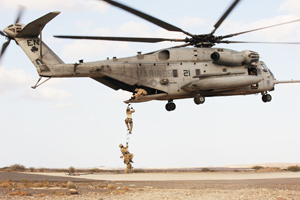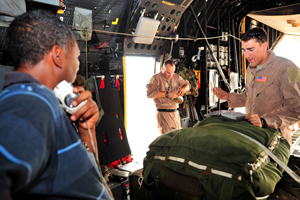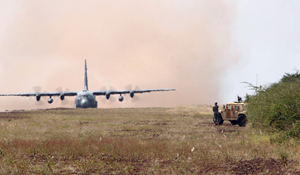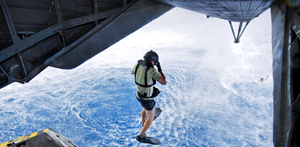Air Forces Africa, the air component for the new US Africa Command, has begun solidifying its nascent command and control capabilities and boosting its “soft power” efforts, especially in the restive Horn of Africa and its immediate environs.
The Horn of Africa—Djibouti, Somalia, Ethiopia, and Eritrea—is wracked by security dangers. The diverse problems include rampant piracy in the Gulf of Aden and a sputtering civil war in Somalia, which has not enjoyed a functioning government since 1991.
Somalia, in particular, is a concern for AFRICOM’s leadership. It is a nonfunctioning state rife with militias and terrorist elements.
“I don’t think that it is a secret” that Somalia is “generally an ungoverned state,” said Maj. Tony Carr, a division chief in AFAFRICA’s operational plans shop.
 |
|
Somalia is not the only concern. To the west lies southern Sudan where AFAFRICA (also known as 17th Air Force) carried out its first major air operation in January 2009. That was when two C-17s transported vehicles and special equipment from Rwanda to the Darfur region. This took place over the course of a few weeks, to supply troops assigned to a joint African Union-United Nations peacekeeping mission.
The US government is taking an active approach to regional concerns, and USAF has a hand in much of this. There are no permanently assigned forces on the continent, or even a headquarters, but that does not mean the Air Force isn’t active.
Partnerships with neighboring countries and the various security organizations in the region are vital to the success of AFRICOM’s mission—particularly in humanitarian assistance and contingency operations. “It’s an area where we are thinking about a wide range of scenarios where we might help people respond,” Carr said.
From its headquarters at Ramstein AB, Germany, AFAFRICA has pushed to improve command and control activities in Africa, the better to keep track of threatening developments. The 617th Air and Space Operations Center (AOC) at Ramstein is crucial to continuous air command and control capability for all theater security cooperation exercises, engagement activities, and crisis response operations.
With the AOC now at full operational capability, it can provide a common operating picture of all air and space missions over Africa from its Ramstein location.
Wrapping up a $6.3 million effort that began in October 2008, upgrades to the AOC went through while 17th Air Force staff conducted operations, officials said. This was done with around a third of the building undergoing modification at any given time. The center experienced major reconfiguration, carving out classified work areas, installing new fiber optics, and upgrading the electrical capacity of the facility.
“We’re housed, processes are built, and we’re up and running 100 percent,” said Maj. Gen. Ronald R. Ladnier, commander of Air Forces Africa.
AFAFRICA has spent a good chunk of time since 2008 playing catch-up as its taskings have grown steadily. Its 404th Air Expeditionary Group routinely flies three- to four-day airlift missions from Ramstein, across Africa, transporting medical groups, security training teams, and supplies.
 |
|
Now with a full-up AOC, 17th Air Force’s engagement activities will decidedly increase, Ladnier said. He noted that back in early 2009, AFAFRICA routinely had six to eight security cooperation events going on at any given time on the continent. These taskings have blossomed by 300 percent from last fiscal year.
Staff and planners at 17th Air Force are already assembling plans for the 2011-12 fiscal years, as several officials anticipate even more expansion.
“Our objective is sustained engagement. We don’t just want to roll into town. We want to engage with forces but continue to help develop relationships,” Ladnier said.
The work is challenging and often complicated, working with foreign governments, the US State Department, and nongovernmental entities such as the United Nations and African Union.
One of the sayings at the command is, “He who plans early in Africa plans often.” So quipped Col. John Yocum, chief of the regional engagement division at 17th Air Force, where the command’s security cooperation events are assembled. “We have about a six-month lead time,” he said. “With no assigned forces, we have to leverage the Total Force to get the people we need, the subject matter experts. We have to work the same process as other [combatant commanders] to get forces,” he said.
“We’ve seen entire governments come and go. … Now, all the stuff that you’ve planned out might have to change,” he said.
East Africa is a focal point for US concerns on the continent. There is instability in the Horn, unrest in southern Sudan, and the presence of yet another al Qaeda franchise.
Al Qaeda in Somalia
Daniel Benjamin, the State Department’s coordinator for counterterrorism activities, said he is working with “local players” along with allies to ensure governance returns to areas such as Somalia. “Obviously, the [Transitional Federal Government] in Somalia is not in a position yet to be a really aggressive counterterrorism force, and so to a certain extent, we need to continue building up the TFG’s capabilities,” he said in January.
Col. Todd Brooks, the division chief of the 617th AOC’s strategy and combat plans division, said 17th Air Force’s nerve center has stepped up to play a larger role in Horn operations. This is primarily by assisting the Combined Joint Task Force-Horn of Africa, based at Camp Lemonnier, Djibouti, in its security partnership work.
“We’ve been getting personnel, trying to put a plan together to train folks and get our feet wet with operations on the continent,” Brooks said. When he arrived at Ramstein in June 2009, the AOC had about 50 personnel. Today, the number is around 130.
As of Jan. 5, 17th Air Force assumed responsibility as the joint force air component commander for CJTF-HOA. In this role, it helps deconflict the busy airspace around the Horn, as the region is home not only to a range of peacekeeping operations but also the multinational anti-piracy effort in the waters off Somalia.
Air Forces Africa took over airspace authority from Air Forces Central, and has responsibility to build a daily air tasking order for the region. This authority helps tremendously to legitimize cooperative efforts with other nations in the region, Brooks said.
 |
|
The work of the 617th is somewhat dissimilar to other AOCs, Brooks notes—especially on the Horn. It does not compile a targeting list daily, like US Central Command does, he said. “What we do is a lot of airlift missions, so we work over vast distances,” he said. They build engagement lists. “We have to take things [in the AOC] and tweak them so they fit our mission and what we’re asked to do.”
Military strikes in Africa on terrorist elements are rare, and AFRICOM downplays them, but US forces, particularly special operators, have featured in several limited strikes in the region.
For example, US and Ethiopian forces have sought out key al Qaeda militants, who reportedly took shelter in Somalia. In January 2007, the Pentagon confirmed an AC-130 strike in the southern part of the country, targeting al Qaeda leadership involved in the 1998 attacks on US embassies in Kenya and Tanzania.
Last September, a senior al Qaeda operative was killed in a special operations raid in southern Somalia. Saleh Ali Saleh Nabhan, a Kenyan tied to the bombing of the embassies in 1998 and other attacks, was traveling in a car near Barawe, Somalia, when special operations forces helicopters descended on the convoy, killing him in the assault. The military had long sought Nabhan, believing him closely involved in al Qaeda’s East African operations. He also had links to al Shabaab, a militant wing of Islamic Courts Union which took over most of southern Somalia in 2006 and uses terror attacks and guerilla warfare against the US-backed transitional government.
Al Shabaab also announced its support to al Qaeda’s Yemen branch, while its activities increased on the Arabian Peninsula. Yemen lies only 20 miles from Somalia on the Bab al Mandab Strait.
For its part, AFAFRICA is taking measured public steps. It pieces together units, including Guardsmen and Reservists, to carry out theater activities. AFAFRICA has a “significant relationship” with the 110th Air Operations Group of the Michigan Air National Guard, a former A-10 unit realigned to perform the air and space operations center mission, Brooks noted. With experienced Guardsmen working in both coordinating assigned forces and AOC duties, their alignment under the 617th AOC in April of 2009 is paying dividends.
“They bring a lot of stability and expertise,” Yocum said. “In Africa, particularly, … it’s about relationships. … If I can send the same guy over and over again, we’ve found the Guard has provided us a key [for] the long term.”
Frequently, events involve multiple services, Guardsmen, and Reservists. Last August, a team of airmen from Ramstein’s 37th Airlift Squadron, along with two Army Reservists, traveled to Entebbe, Uganda, to train members of the country’s defense force to improve operations on their L-100 aircraft, a civilian version of the C-130.
Getting People Savvy
The event paired airmen with members of the Ugandan military to go over classroom instruction and in an exercise focusing on air-dropping goods and equipment. The cooperation included work on tasks such as palletizing cargo, weighing and inspecting cargo, and preparing to air-drop supplies for humanitarian purposes.
The training is part of the Africa Deployment Assistance Partnership Team (ADAPT) program, an AFRICOM effort funded through the State Department’s global peace initiative that aims to enhance projection abilities of African militaries, standby forces, and coalition partner forces and improve interoperability.
Culminating with a few live airdrops, the effort was rated a success by both the US Embassy and the Ugandan government, and is an example of the many benefits of such activities. “Uganda is a regional hub for peacekeeping from an airman’s perspective,” Yocum said, since many airlift missions to locations such as Somalia and Sudan transit Ugandan bases. But the Ugandans also have needs of their own, with seasonal major flooding and a need to get relief supplies to isolated villages along the Nile River.
Engagement goes the other way as well. In February, six Ethiopian Air Force officers visited the 449th Air Expeditionary Group at Camp Lemonnier to discuss air-drop procedures for the country’s small C-130 force. Airmen from the 81st Expeditionary Rescue Squadron briefed the Ethiopians on air-drop tactics, collision avoidance systems, personnel air-drop procedures, and other topics—in addition to showing them a C-130J.
 |
|
These experiences and activities in the region are vital to developing a cadre of foreign air officers in USAF, Yocum said, as the nature of AFRICOM’s work demands adaptable airmen ready for a challenge. The Air Force is looking to send captains and majors to school to get trained up on the intricacies of international affairs, such as tactics for dealing with political affairs and the cultural issues inherent to working in East Africa. “We want to get people savvy. Develop languages—Arabic, Swahili, Portuguese, etc.,” said Yocum. Working with partner air services in Africa is also paying dividends for US airmen, he added, noting the work that 17th Air Force carries out with the Kenyan Air Force in pilot currency efforts.
“We were able to send in some instructor pilots and compared programs,” he said. Yocum praised the Kenyans’ adeptness at utilizing their small force and their experience in bush-flying in austere areas, with light mobility and light attack capabilities which “we might be able to learn something from as we develop our own programs in those areas.”
The currently stretched 17th Air Force is also getting assets faster than when it was activated in late 2008, Ladnier noted. In December 2009, a C-130J transport flew the first support mission for 17th Air Force, transporting service members back from Mali, where they had been involved in training activities.
The J model, assigned to the 86th Airlift Wing at Ramstein, replaced the wing’s older Hercules models, and their enhanced capabilities should prove useful in dealing with the distances and austere conditions that are often a factor in flying African missions. The 86th is the first wing outside the US to have assigned J-model C-130s, and their range and other capabilities have already been beneficial. The transport needs a minimum of three crew members, compared to five for older H- and E-model Hercs.
Critical to operations in East Africa are future air safety capabilities and tools, 17th Air Force officials repeated several times.
“If you look at the air picture over Africa, it can be scary,” Yocum pointed out. With a huge land mass and sparse infrastructure, “you’re not under anyone’s guidance,” so pilots often use visual separation in the air and on the ground, due to lack of radar and communications. Another critical concern cited by Yocum: Runways are frequently not secured.
AFAFRICA’s command and control effort includes an Air Domain Safety and Security program. ADSS uses airmen and working with other government agencies and partner institutions to develop regional air safety and security tools for African nations. Improvements will benefit both civil and military air operations, Ladnier said.
The program is projected to grow from $2.6 million in 2010 to $3.1 million in 2011. Many African nations are eager to develop their air infrastructure, as it is crucial to development, commerce, and connectivity.
The air safety program is huge in East Africa. “It’s a model to help develop … infrastructure in Africa, … particularly aviation capacity building,” Yocum said.
One of the success stories is AFAFRICA’s work with Rwanda, where its government was able to build up air traffic control tools in order to become a regional hub for air control. Teams from 17th Air Force have visited the country and performed assessment activities with the military and civil aviation officials, advising and examining how they can develop infrastructure to get a regional-type capability. This is accomplished by improving radars, communication tools, and networks with other countries, Yocum added. ADSS will help fund activities such as consultation on airfield security and improving screening procedures for civilian air traffic.
A Delicate Process
Maintenance practices are also a focus for future improvement. “I see capable aircraft a lot, but they have maintenance issues,” Ladnier said. The US Air Force, he observed wryly, knows a few things about keeping old airplanes flying.
Yocum said several allied African nations are participating in Air Force Special Operations Command’s partnership aviation course at Hurlburt Field, Fla. Hurlburt is also home of the service’s aviation foreign internal defense unit, the 6th Special Operations Squadron. The 6th SOS is performing low-profile missions around the world. The security assistance work is considered a critical element of US partnership efforts with allied militaries. The mission is receiving increased attention from the Air Force.
Bringing foreign airpower into play is a delicate process, said Lt. Col. Joseph Michalek, commander of the 6th SOS, but helping allies put airpower to work for their people is a key to the success. The results in African nations are “a good example of that,” Michalek said without mentioning specific details.
In Africa, airpower makes a big difference in small ways. It enables improvements to come in areas ranging from mobility to medical evacuation, so that governments are better able to serve their populations.
“We get in there and give them the ability to go out and see the people,” Michalek noted.
Yocum attributes this to the number of airmen returning from Iraq and Afghanistan with experience performing security assistance work with those countries’ respective air services.
The US is currently developing a 10-year assistance plan for Mali, which wants better aircraft, maintenance, and logistics systems to help the country become more integrated with UN and African Union efforts—not to mention becoming more open to trade. AFAFRICA officials are hoping to generate similar efforts in East Africa.
“I think there has been a realization that … if you have friendships and trust, you have friends and partners who are willing to stand by and help you accomplish your mission,” Yocum said. This can reduce the burden on USAF as well: If host nations can move peacekeepers around independently, the Air Force doesn’t have to use its C-17s for that purpose.
